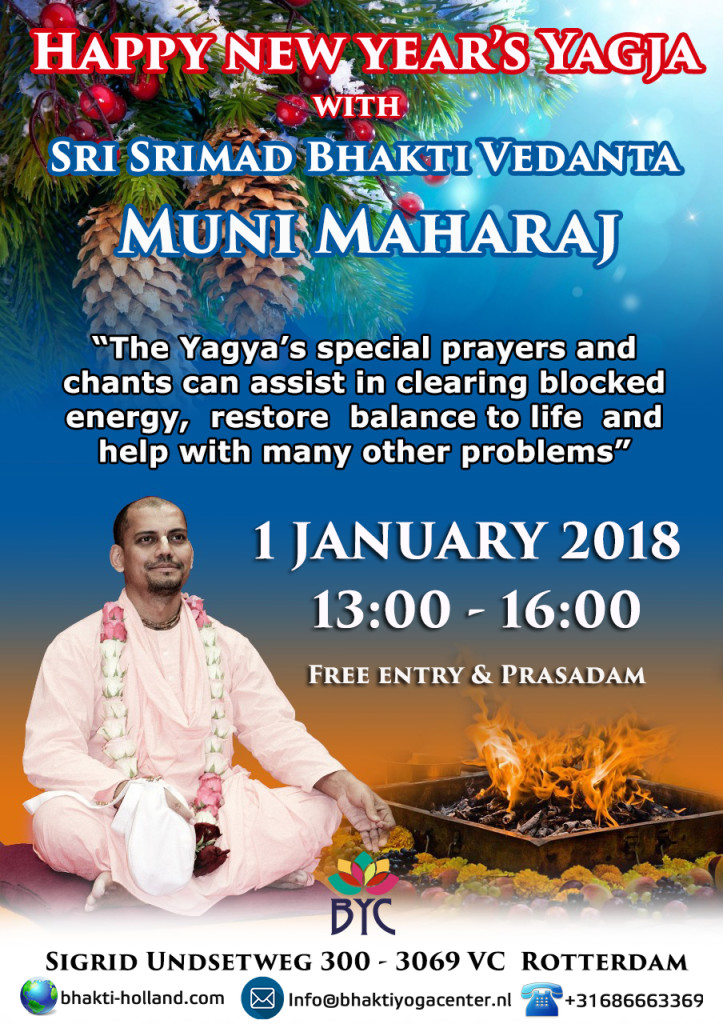Om het nieuwe jaar goed in te luiden organiseren wij een Happy New Year’s Yagje met Sri Srimad BV Muni Maharaja op maandag 1 januari 2018. De Yagje vind plaats in onze BYC aan de Sigrid Undsetweg 300 te Rotterdam en zal zijn van 13:00 uur tot 16:00 uur. Iedereen mag deelnemen aan deze speciale Yagje. Toegang is gratis en na afloop zal er prasadam worden geserveerd. Hieronder leest u over de voordelen van een Yagje.
Why is a fire sacrifice so beneficial?
Ancient Vedic literature carries many passages explaining the power and benefit of performing fire rituals.
Krishna explains the origin of fire rituals (sacrifices): “At the beginning of creation, Prajapati created both sacrifices and the human race. He told the humans, “Let the sacrifices be the bestower of all you need.””
“Through the performance of fire sacrifices, become abundantly prosperous.“(The Bhagavad Gita, Chapter III, Verse 10)
“The Devi and Devta’s, being pleased by the sacrifice, will please the humans. Prosperity will be created by the mutual co-operation of man and the devi devta’s through sacrifice.” (The Bhagavad Gita, Chapter III, Verse 11)
Yagya is a Spiritual and very blissful and highly auspicious way to please the different aspects of Nature and a Yagya helps to grow and improve the will- power and self-confidence of the individual; plus, a person gains the support of Nature.
Performance of the Yagya can very gently help solve problems, conflicts and remove blockages in one’s life.
The Importance of a Yagna
Yagna holds a supreme position in Hindu culture, with no major ceremony or milestone in life being complete without inviting the Agni or Fire God as the chief guest. Multifold offerings to this chief guest is what a yagna is all about, accompanied by chanting of Vedic mantras each time an offering, or aahuti, is made.
The name Yagna
The word Yagna is derived from the Sanskrit verb yaj, which has a three-fold meaning of devapujana or worship of deities, saogatikarana or unity, and daana or charity. A yagna is one of the oldest rituals in Sanatan Dharma for propitiating the deities. Yagna encompasses the qualities of satkaar or welcoming a guest, upkaar or putting the needs of another over our own, and sangathan or unity. Since it is all about giving, therefore people are advised to give with as much grace as they can, rather than a sense of obligation.
Agni as the Messenger
Why is an Agni Kund such a vital part of Yagnas? It is because by making an offering of gratitude and sacrifice to the fire, the offering is believed to reach God directly and quickly.
The Agni Kund
The platform of the Agni Kund is known as vedi. The pit into which the oblations are offered is known as askund. The wood that is used to stoke the fire is known as samidh, and is only to be obtained from specified trees like ashvattha, palash, khadira, nyagrodha or shami. The shami tree is particularly auspicious as it is regarded as the agni garbha or mother of fire. The ladle used to pour ghee into the fire is known as agnihotra havani, ans ia also made of a special wood, the vaikankata. The person who sponsors the yagna is known as yajamãn. The chief brahmin pandit conducting the rites is known ashotru or adhvaryu. He may be helped by another pundit who chants stotras. He is known as prati-prasthãtru orudgãtru.
The Benefits of a Yagna
What does performing a yagna do for you? As the holy smoke from a yagna permeates our house, it not only eradicatesd all ill effects and negativity from our home, it also brings with it peace, happiness, prosperity, wealth and contentment. According to the Yajur Veda, it also bestows strength and vigour by sanctifying the food one eats and the water one drinks. Moreover, the presiding deva Agni, who is described thus – yagnasya devam – is believed to secure puro-hitam, or the welfare of all.
Nothing Belongs To Us
A beautiful aspect of yagnas is the mantra uttered by pandits while performing the yagna. They ask the performer of the yagna to offer the ahuti or puja material into the fire and to chant Idam Na Mama, meaning This Is Not Mine. Herein lies the main significance of a Yagna. When the possessive mama, meaning mine, is eradicated from our thinking, ahamkar or ego too gets destroyed. This is the essence of Sanatan Dharma expressed through its yagna bhavna, which appeals to man to forsake his self-centredness and offer himself to the service of others.
